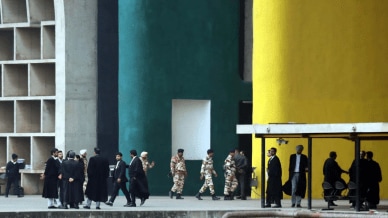Stay updated with the latest - Click here to follow us on Instagram
HC quashes promotions of long-distance diploma holders
Justice Harpreet Singh Brar slammed Haryana Power Generation Corporation’s ‘selective reading’ of a 2019 Supreme Court ruling and restored the seniority of engineering diploma holders.

The Punjab and Haryana High Court has struck down the promotions of several Haryana Power Generation Corporation (HPGC) employees who advanced on the basis of qualifications from the Institution of Mechanical Engineers (IME).
Justice Harpreet Singh Brar, in a 40-page judgment delivered on September 9, held that IME certifications cannot override statutory requirements for three-year regular engineering diplomas.
monthly limit of free stories.
with an Express account.
The ruling, which consolidated five connected petitions led by Sat Paul and others vs State of Haryana, restores the seniority of diploma-holding petitioners while criticising HPGC for a “belated” and “unfair” reinterpretation of a 2019 Supreme Court verdict.
The dispute
The case centred on HPGC’s promotion policy of December 29, 2004, which reserved 15 per cent of posts in Operator Grade-I and Foreman Grade-II for staff with “B.E./AMIE in Electrical/Mechanical/Electronics Engineering or three years Diploma in Engineering,” provided they had three years’ experience.
The petitioners, who began as Plant Attendants Grade-II or Technician-II, earned their diplomas by taking leave without pay to enrol in full-time courses. “Some of the petitioners spent three years out of service as they acquired the diploma before joining,” Justice Brar noted, stressing that they had pursued “a regular course which is more rigorous in nature and covers all requisite fields of technical education”.
In contrast, private respondents relied on IME’s distance learning programme, which “did not require attendance but allowed students to appear in examination to obtain a qualification advertised as equivalent to a degree in Mechanical Engineering”. Though IME was derecognised and later given limited recognition in 2016, HPGC promoted these candidates and reversed the petitioners’ promotions in February 2024 to accommodate them.
Court’s findings
Justice Brar rejected HPGC’s reliance on a “selective reading” of the 2019 Supreme Court ruling in the IME case. “Tritely, a judgment must be interpreted in the context of the facts of the specific case… It is neither appropriate nor permissible to isolate a word or a sentence… and treat it to be the complete law in itself,” he wrote.
On the validity of IME certifications, the court observed: “The respondent-IME does not claim to provide technical education through distance learning by conducting regular classes; rather, it merely conducts bi-annual examinations and issues certificates to those who pass.” Recognition granted by the HRD Ministry in 2012 was limited to central government employment, the court underlined.
Citing precedents such as the Supreme Court’s Orissa Lift Irrigation Corporation Ltd. v. Rabi Sankar Patro (2017), the court stressed that one-time protections for IME degree holders could not be extended to claim further service benefits. It also pointed to Haryana’s 2013 notification barring unrecognised distance education qualifications for promotions in technical posts, and an AICTE notice clarifying that engineering through distance mode is not recognised.
Justice Brar concluded that promoting IME certificate holders “violates the spirit and purpose” of the 2019 ruling. “This court cannot allow the private respondents to steal a march over the petitioners on the basis of certificates obtained from respondent-IME, which has consistently failed the judicial scrutiny of constitutional courts,” the court stated.
Relief granted
The court ordered that promotions of IME certificate holders be withdrawn and the petitioners’ positions restored.
Exercising powers under Article 226, the court emphasised equity: “The High Court, when exercising its powers under Article 226 of the Constitution of India, has the authority to examine the full facts and circumstances of a case and issue appropriate orders to ensure complete and substantial justice to the parties involved. This extraordinary jurisdiction is exercised in accordance with the principles of equity. A fundamental purpose of equity is to uphold honesty and fair conduct. Therefore, if a party has obtained an unfair advantage prior to approaching the High Court, the court may consider such advantage and require the party to relinquish it before any relief is granted. Resultantly, it has to be held that the benefits given to the private respondents can be withdrawn.”